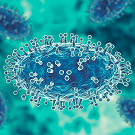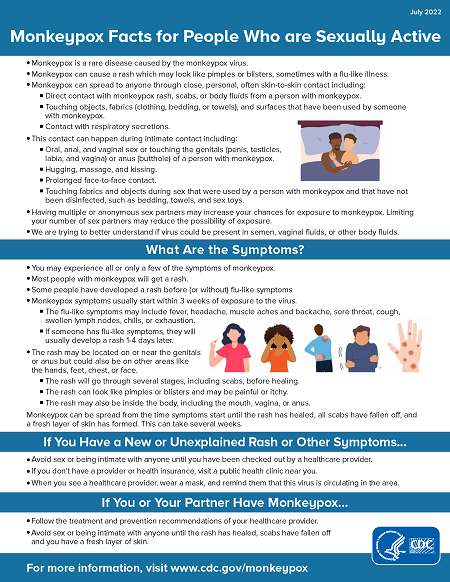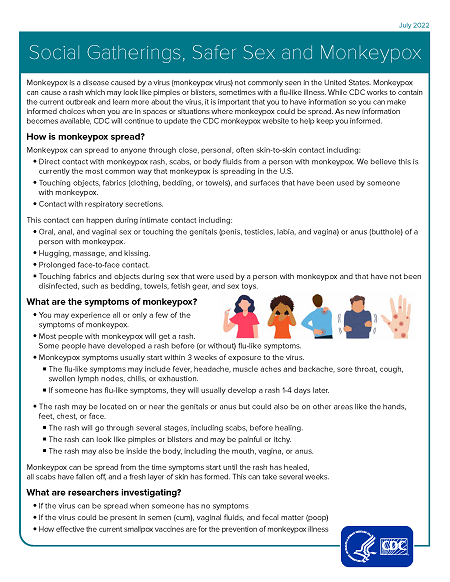What is Monkeypox?
Monkeypox is typically a rare disease caused by the monkeypox virus. During 2022, cases of monkeypox have been reported in areas where monkeypox is not usually found. This includes various countries around the world, throughout the U.S., and here in Ohio. The type of monkeypox seen in this outbreak is rarely fatal, and most people recover from their illness within 2-4 weeks without needing any specific treatment. However, some people with monkeypox infection may be at higher risk for severe illness, including people who have weakened immune systems.
At this time (Aug 2022), the risk of monkeypox in the U.S. and Ohio is believed to be low. Monkeypox does not spread easily between people, but anyone in close contact with a person with monkeypox can get it and should take steps to protect themselves
Symptoms
Monkeypox might start with symptoms like the flu, with fever, low energy, swollen lymph nodes, and general body aches. Within 1 to 3 days (sometimes longer) after the appearance of fever, the person can develop a rash or sores. The sores will go through several stages, including scabs, before healing. They can look like pimples or blisters and may be painful and itchy.
The rash or sores may be located on or near the genitals (penis, testicles, labia, and vagina) or anus (butt) but could also be on other areas like the hands, feet, chest, and face. They may also be limited to one part of the body.
People with monkeypox may experience all or only a few of these symptoms. Most with monkeypox will develop the rash or sores. Some people have reported developing a rash or sores before (or without) the flu-like symptoms. Monkeypox can spread from the time symptoms start until all sores have healed and a fresh layer of skin has formed. This can take several weeks.
Transmission
Monkeypox spreads primarily through direct contact with infectious sores, scabs, or body fluids, including during sex, as well as activities like kissing, hugging, massaging, and cuddling. Monkeypox can spread through touching materials used by a person with monkeypox that haven’t been cleaned, such as clothing and bedding. It can also spread by respiratory secretions during prolonged, close, face-to-face contact.
- Monkeypox can be spread through:
- Direct skin-skin contact with rash lesions
- Sexual/intimate contact, including kissing
- Living in a house and sharing a bed with someone
- Sharing towels or unwashed clothing
- Respiratory secretions through prolonged face-to-face interactions (the type that mainly happen when living with someone or caring for someone who has monkeypox)
- Monkeypox is NOT spread through:
- Casual brief conversations
- Walking by someone with monkeypox, like in a grocery store
Prevention
There are number of ways to prevent the spread of monkeypox, including:
- Always talking to your sexual partner/s about any recent illness and being aware of new or unexplained sores or rashes on your body or your partner’s body, including on the genitals and anus
- Avoiding close contact, including sex, with people with symptoms like sores or rashes
- Practicing good hand hygiene
- People who become infected should isolate until their symptoms are improving or have gone away completely. Rash should always be well covered until completely healed.
- Using appropriate personal protective equipment (PPE) (like a mask, gown, and gloves) when caring for others with symptoms
- Avoiding contact with infected materials contaminated with the virus
- Avoiding contact with infected animals
Diagnoses
If you have a new or an unexplained rash or other symptoms, seek medical care for further testing and evaluation.
- Wear a mask and tell your healthcare provider of your current symptoms for possible monkeypox.
- If you do not have a healthcare provider or healthcare insurance, visit a public health clinic or local county clinic.
Avoid crowds, close contact, including sexual or intimate contact until seeing your healthcare provider.
Fact Sheets
Click on the image below to get the pdf.
Links
- CDC Monkeypox Information
- CDC US Map & Case Count
- Pets & Monkeypox
- Ohio Department of Health Monkeypox
- Ohio Department of Health Monkeypox FAQ
Videos
CDC: 5 Things Sexually Active People Need to Know About Monkeypox
Kaiser Family Foundation: What is Monkeypox
UC Davis: What is Monkeypox? Symptoms, Transmission & Vaccination Questions Answered
Page reviewed 08/02/22




